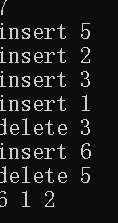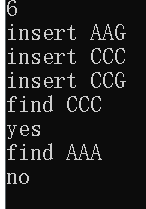源自挑战程序设计竞赛以及其他博客。
平时常用的头文件。bits不敢滥用。
#include <iostream> #include <algorithm> #include <cmath> #include <stdio.h> #include <cstring> #include <string> #include <cstdlib> #include <queue> #include <stack> #include <set> #include <vector> #include <map> #include <list> //#include <> using namespace std;
1.插入排序
1 void insertionsort(int* a,int n) 2 { 3 int v,j; 4 for(int i=1;i<n;++i) 5 { 6 v=a[i]; 7 j=i-1; 8 while(j>=0&&a[j]>v) 9 { 10 a[j+1]=a[j]; 11 j--; 12 } 13 a[j+1]=v; 14 trace(a,n); 15 } 16 }
2.冒泡排序
sw代表swap的次数。
1 int bubblesort(int *a,int n) 2 { 3 int sw=0; 4 bool flag=1; 5 for(int i=0;flag;i++) 6 { 7 flag=0; 8 for(int j=n-1;j>=i+1;j--) 9 { 10 if(a[j]<a[j-1]) 11 { 12 swap(a[j],a[j-1]); 13 flag=1; 14 sw++; 15 } 16 //trace(a,n); 17 } 18 } 19 return sw; 20 }
。。。
3.双向链表
struct Node{ int key; Node *next,*prev; }; Node *nil; Node *listSearch(int key) { Node *cur=nil->next; while(cur!=nil&&cur->key!=key) { cur=cur->next; } return cur; } void init(){ nil=(Node*) malloc(sizeof(Node)); nil->next=nil; nil->prev=nil; } void printList(){ Node *cur=nil->next; int isf=0; while(1){ if(cur==nil) break; if(isf++>0) printf(" "); printf("%d",cur->key); cur=cur->next; } printf(" "); } void deleteNode(Node *t){ if(t==nil){ return; } t->prev->next=t->next; t->next->prev=t->prev; free(t); } void deleteFirst(){ deleteNode(nil->next); } void deleteLast(){ deleteNode(nil->prev); } void deleteKey(int key){ deleteNode(listSearch(key)); } void insert(int key){ Node *x=(Node *)malloc(sizeof(Node)); x->key=key; x->next=nil->next; nil->next->prev=x; nil->next=x; x->prev=nil; } int main() { int key,n,i,size=0,np=0,nd=0; char com[21]; scanf("%d",&n); init(); for(int i=0;i<n;++i){ scanf("%s%d",com,&key); if(com[0]=='i') { insert(key); np++; size++; } else if(com[0]=='d') { if(strlen(com)>6){ if(com[6]=='F') deleteFirst(); else if(com[6]=='L'); deleteLast(); } else{ deleteKey(key); nd++; } size--; } } printList(); return 0; }
4.pair ,make pair 的使用(ALDS1——3——B Queue)
1 int main() 2 { 3 int n,q,t; 4 string name; 5 queue<pair<string, int> > Q; 6 7 cin>>n>>q; 8 9 for(int i=0;i<n;i++) 10 { 11 cin>>name>>t; 12 Q.push(make_pair(name,t)); 13 } 14 15 pair<string ,int> u; 16 int elaps=0,a; 17 18 while(!Q.empty()){ 19 u=Q.front(); 20 Q.pop(); 21 22 a=min(u.second,q); 23 u.second-=a; 24 25 elaps+=a; 26 if(u.second>0){ 27 Q.push(u); 28 } 29 else{ 30 cout<<u.first<<" "<<elaps<<endl; 31 } 32 } 33 return 0; 34 }
5.vector的操作
void print(vector<double> V){ for(int i=0;i<V.size();i++){ cout<<V[i]<<" "; } cout<<endl; } int main() { vector<double> V; V.push_back(0.1); V.push_back(0.2); V.push_back(0.3); V[2]=0.4; print(V); V.insert(V.begin()+2,0.8); print(V); V.erase(V.begin()+1); print(V); V.push_back(0.9); print(V); return 0; }

6.list操作
。
1 int main() 2 { 3 int q,x; 4 char com[20]; 5 6 list<int> v; 7 scanf("%d",&q); 8 9 for(int i=0;i<q;++i) 10 { 11 scanf("%s",com); 12 //insert 13 if(com[0]=='i') 14 { 15 scanf("%d",&x); 16 v.push_front(x); 17 } 18 //deleteLast 19 else if(com[6]=='L') 20 { 21 v.pop_back(); 22 } 23 //deleteFirst 24 else if(com[6]=='F') 25 { 26 v.pop_front(); 27 } 28 //delete 29 else if(com[0]=='d') 30 { 31 scanf("%d",&x); 32 for(list<int>::iterator it = v.begin();it!=v.end();it++) 33 { 34 if(*it==x) 35 { 36 v.erase(it); 37 break; 38 } 39 } 40 } 41 } 42 43 int i=0; 44 for(list<int>::iterator it = v.begin();it!=v.end();it++) 45 { 46 if(i++) 47 printf(" "); 48 printf("%d",*it); 49 } 50 51 printf(" "); 52 return 0; 53 }

6.散列法
#define M 1046527 #define NIL (-1) #define L 14 using namespace std; char H[M][L]; int getChar(char ch) { if(ch=='A') return 1; if(ch=='C') return 2; if(ch=='G') return 3; if(ch=='T') return 4; return 0; } long long getKey(char str[]) { long long sum = 0,p=1,i; for(i=0;i<strlen(str);i++) { sum+=p*(getChar(str[i])); p*=5; } return sum; } int h1(int key){ return key%M; } int h2(int key){ return 1+(key%(M-1)); } int find(char str[]){ long long key,i,h; key = getKey(str); for(i=0;;i++) { h=(h1(key)+i*h1(key))%M; if(strcmp(H[h],str)==0) return 1; else if(strlen(H[h])==0) return 0; } return 0; } int insert(char str[]) { long long key,i,h; key =getKey(str); for(i=0;;i++) { h=(h1(key)+i*h1(key))%M; if(strcmp(H[h],str)==0) return 1; else if(strlen(H[h])==0) { strcpy(H[h],str); return 0; } } return 0; } int main() { int i,n,h; char str[L],com[9]; for(i=0;i<M;i++) { H[i][0]='�'; } scanf("%d",&n); for(i=0;i<n;i++) { scanf("%s%s",com,str); if(com[0]=='i'){ insert(str); } else{ if(find(str)){ printf("yes "); } else{ printf("no "); } } } return 0; }
。。